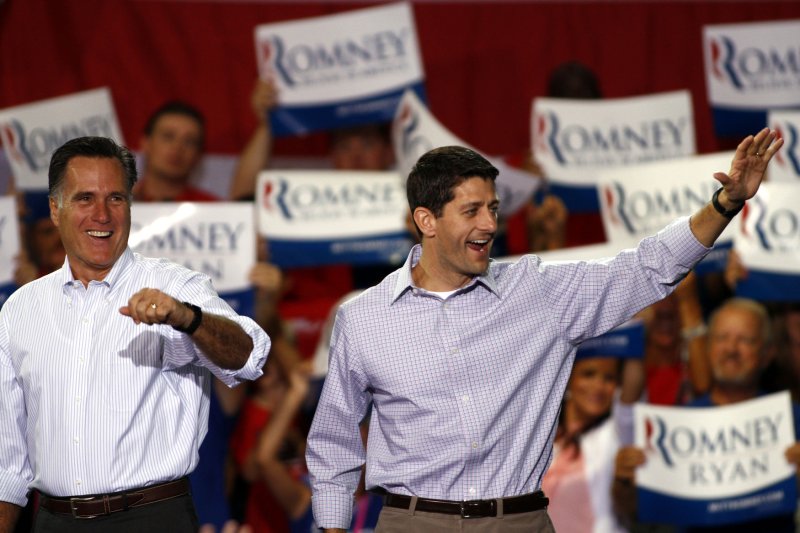Soon after presumptive Republican presidential nominee Mitt Romney tapped Rep. Paul Ryan of Wisconsin as his running mate, the GOP standard-bearer had to stray from his message about how dismal the economy has been under President Obama. Aug. 12 file photo. UPI/Nell Redmond . |
License Photo
Soon after presumptive Republican presidential nominee Mitt Romney tapped Rep. Paul Ryan of Wisconsin as his running mate, the GOP standard-bearer had to stray from his message about how dismal the economy has been under President Obama.
How long can he afford to go off-topic to respond to the opposition's attacks over the GOP budget plan developed by Ryan as the House Budget Committee chairman.
Eventually, Romney and Ryan will return to the campaign's economic mantra and can wrap the opposition's accusations about the Ryan budget and his vision for transitioning Medicare to a voucher system into its discussions on the economy.
"The Romney campaign will tie budget and entitlement reform to the economic issue, arguing that unless those problems are resolved, the economy over time cannot prosper," said political commentator Steve Schier, a political science professor at Carleton College in Minnesota. "That is a complicated message, however, and it is a big challenge for the Romney campaign to deliver it."
On the campaign trail, Romney hasn't provided many specifics about how he'd reduce the deficit, pull the economy out of its doldrums or increase jobs rolls.
Now, however, "Romney seems to have decided that he cannot win the presidency without also providing a clear, alternative direction to that provided by the Obama presidency," Schier said. "So he picked Ryan as an exemplar of that alternative direction."
The gambit may work because the American people "are so exasperated that they may demand clarity from both presidential candidates before the campaign is over."
Whether Romney exhibited acumen in picking Ryan is up in the air, pundits say, because Ryan brings "some controversial and specific policies to the Romney ticket that Democrats have targeted already with relish," Schier said.
"Expect many Democratic ads right away on how Ryan and Romney will supposedly destroy both Medicare and Social Security, programs that remain very popular with the American people," the commentator said.
Observers already have wondered whether the Democrats can get their message to the voters as well as the Republicans did in 2010, when the Republicans stormed to claim control of the House.
"The election will be won or lost in large part by whether or not this Democratic messaging works," Schier said.
The National Journal said Romney's selection of Ryan could expand tension between the GOP policy agenda and the voters it relies on to win.
Ryan's budget blueprint, passed twice by the GOP-controlled House in the past two years, encapsulates the party's top priority: Shrink the size of the federal government through restructured entitlement programs led by Medicare and Medicaid.
"By putting Ryan on the ticket, the Ryan budget is their vision for the country," veteran Democratic pollster Stanley B. Greenberg told the Journal. "They think the biggest problem of government is the money being spent on universal programs that older white, non-college and working-class voters depend on to have a middle-class retirement."
Veteran GOP consultant David Carmen recognizes that such attitudes could threaten the GOP's standing among whites still suffering from the economic downturn. But, he said, it could be worth that risk for Romney to broaden the campaign debate beyond the personal tenor that has dominated so far.
"The issue is who defines whether the GOP is saving Medicare or killing it," Carmen said. "But it's a bold elevation of the whole campaign and I think that whoever gets to positive faster and more credibly is going to score big. It's hope and growth one more time."
Romney didn't experience an appreciable bump in the polls after he named Ryan as his running mate last weekend, Gallup polling indicated.
Gallup said Romney was supported by 46 percent of registered voters before he named Ryan Aug. 11 and was backed by 47 percent for the first four days of Gallup Daily tracking after the announcement.
The same poll results indicated 45 percent of registered voters said they supported Barack Obama both before and after the Ryan announcement.
In Wisconsin, the native son's presence on the GOP ticket tightened the presidential race, a Rasmussen Reports poll late last week indicated.
The statewide telephone survey of likely voters indicated Romney had 48 percent support to President Obama's 47 percent. In late July, Obama had 49 percent to Romney's 46 percent.















